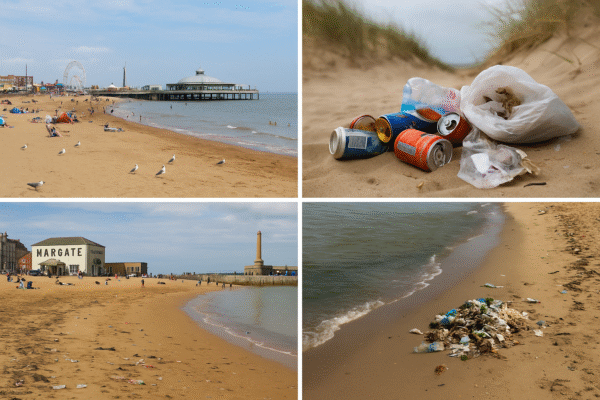The United Kingdom’s coastline has long been a magnet for both domestic and international visitors, but rising pollution levels are casting a shadow over its most iconic seaside destinations. Beaches such as Skegness in Lincolnshire and Margate in Kent, once celebrated for their charm, are now making headlines for all the wrong reasons. From plastic waste to human litter, these beaches highlight a growing environmental and tourism challenge that threatens both local communities and the broader reputation of the UK’s seaside tourism.
A Surge in Visitors, A Surge in Waste
The unusually warm summer has brought record numbers of tourists to UK beaches. Families, holidaymakers, and day-trippers have flocked to coastal destinations for sun and sea. However, the increased footfall has also resulted in alarming levels of waste left behind—plastic bottles, food wrappers, broken glass, and even human waste. These items not only tarnish the appearance of the beaches but also create serious health hazards for visitors and devastating consequences for marine life.
At Skegness Beach, reports of broken glass and discarded plastics are common, while some visitors have found traces of human faeces. Despite these shocking revelations, the beach continues to attract families, proving the strength of its reputation as a traditional holiday spot. Yet, such issues underscore the urgent need for stronger waste management systems and community education.
Margate: From Seaside Escape to Troubled Shore
Margate Main Sands, a long-standing favorite for summer holidays, is also under scrutiny. Complaints about hazardous waste—particularly glass shards and excrement—have raised concerns among both locals and tourists. Such conditions can be dangerous for children, pets, and wildlife alike. Tourists have expressed disappointment, saying that the beach’s conditions failed to meet expectations of a relaxing getaway.
Margate’s challenges highlight the delicate balance between accommodating visitors and maintaining environmental standards. Without decisive action, the town risks damaging its long-standing reputation as one of England’s iconic seaside resorts.
Environmental Impact Beyond Tourism
The consequences of beach pollution extend far beyond aesthetics. Marine wildlife is at risk as plastics and waste make their way into the sea. Sea turtles, for instance, often mistake plastic bags for jellyfish—a staple of their diet—leading to potentially fatal consequences. Birds and fish also ingest or become entangled in waste, while the presence of human faeces introduces harmful bacteria into the ecosystem, contaminating both sand and seawater.
This contamination not only affects marine life but also endangers human health. Polluted water can lead to illnesses and bacterial infections among swimmers, while litter scattered across beaches creates hazards for children and families.
Threat to Local Economies
Tourism is a lifeline for many coastal towns. Beaches like Skegness and Margate attract millions each year, generating significant revenue for local businesses including hotels, restaurants, and shops. If pollution levels continue to rise, the threat of beach closures becomes very real—potentially crippling local economies dependent on summer visitors. The long-term damage could be severe, both economically and environmentally.
Steps Towards Cleaner Beaches
Despite the challenges, positive efforts are underway. Local councils and environmental organizations are stepping up campaigns to restore the beauty and safety of UK beaches. Some initiatives include:
- Increasing the number of waste disposal bins on beaches.
- Introducing stricter penalties for littering.
- Organizing community beach clean-ups, where locals and tourists work together to reduce waste.
- Encouraging sustainable tourism practices, such as reusable containers and eco-friendly travel kits.
Public awareness is also on the rise. More tourists are taking responsibility by ensuring they leave no trace behind. Eco-friendly visitors are helping set new standards, proving that responsible tourism can make a measurable difference.
Sustainable Tourism as the Future
Sustainability is becoming a cornerstone of tourism strategies across the UK. By promoting eco-conscious travel, coastal towns hope to preserve their natural beauty while still welcoming high visitor numbers. Investing in education campaigns, strengthening partnerships with environmental charities, and modernizing waste management infrastructure are all essential to reversing the damage already done.
The UK government has also placed increasing emphasis on sustainable coastal tourism in recent years. Protecting beaches is not just an environmental issue—it is a social, cultural, and economic priority. By focusing on both prevention and restoration, the UK can ensure its beaches remain treasured destinations for generations to come.
Conclusion
The pollution problems at Skegness, Margate, and other coastal destinations serve as a wake-up call for the UK tourism industry. These beaches are not only vital for the local economy but also cultural symbols of the British seaside holiday tradition. While challenges are significant, solutions are within reach if communities, tourists, and authorities act collectively.
Cleaner beaches mean safer holidays, healthier ecosystems, and stronger local economies. With urgent action and a commitment to sustainable tourism, the UK can protect its coastlines and maintain their global appeal as safe, welcoming, and beautiful destinations.
For more travel news like this, keep reading Global Travel Wire


















